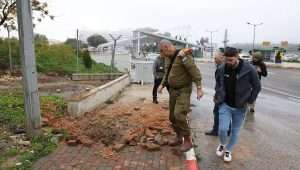To understand why our enemies understand some things better than we do, one has to pay close attention to the Arab press, especially key figures close to Israel’s enemies. On Iran’s “Jerusalem Day,” Hezbollah chief Hassan Nasrallah gave a speech to the nation, but also to Israel, from his hiding place in the bunker. Israel may have overslept the political and strategic developments in the region.
“The withdrawal of US power in the Middle East is the basis for everything that is happening in the region these days. The flight of the Americans from Afghanistan after 20 years, after investing enormous resources, led to a change in perception in the region,” underlined Nasrallah. “As a result, the peoples of the region and their allies have come to realize that the US is acting in its best interests and that Washington cannot be trusted. The peoples of the region have realized that the solution lies within the region itself. Because of this, relations between peoples have warmed up.” He’s absolutely right, and that’s why we have a problem!

This reminds me of the Druze decision in the Golan Heights. They have lived under Israeli rule since the Six Day War in 1967. When Israel signed the peace treaty with Egypt in 1979, the Druze on the Golan Heights understood that they, too, could one day be traded to Syria for a peace treaty. This shaped their understanding that Israel is not a loyal ally, and so they decided to remain loyal to the Syrian government. As a result, the Druze living in the Golan Heights, numbering just under 25,000, switched to an anti-Israel position. Should the Golan Heights one day be handed over to Syria, they need not fear having been pro-Israel. Israel’s subsequent annexation of the Golan Heights in 1981 did nothing for the Druze either. Israel’s departure from Egypt’s Sinai Peninsula made a deep impression on them. And that’s the point Nasrallah made in his speech when he emphasized that the withdrawal of US power from the region is having a dramatic impact on Israel.
This also explains the cooling in relations between Israel and Saudi Arabia. Instead, relations between Hamas and the Saudis are warming. A high-level delegation of Hamas leaders arrived in the Kingdom of Saudi Arabia yesterday to restore ties between the two parties. The last senior Hamas delegation to visit Riyadh was in 2015, after which ties were severed and many Hamas activists were jailed by the Saudis.
This, among other things, facilitated a warming of relations between Jerusalem and Riyadh over the past seven years, with hopes of normalization between the two countries as a result of the Abraham Accords. The Saudi Crown Prince even allowed Israeli airline El Al to fly over Saudi airspace. In addition, Mohammed bin Salman met with Israeli Prime Minister Benjamin Netanyahu and former Mossad chief Yossi Cohen in the port city of Neom on the Red Sea in 2020. The meeting took place in the presence of former US Secretary of State Mike Pompeo. Everything pointed to a new era in our region.

But then boom. Donald Trump lost the US election to Joe Biden. Netanyahu lost the election in Israel. In Europe, war broke out between Russia and Ukraine, pushing the global economy into panic and uncertainty. Iran is taking advantage of Russia’s losses in the war, supplying the Russians with missiles and kamikaze drones against Ukraine. New relations between Moscow and Tehran grow under Chinese auspices. Meanwhile, Netanyahu was re-elected in November 2022 and formed a right-wing governing coalition that is a thorn in everyone’s side, first and foremost those parts of Israeli society that do not agree with his judicial reform.
This is widening a deep rift within Israeli society and making the Arab nations around Israel alert, particularly the Ayatollah regime in Tehran. Iran is capitalizing on the momentum, uniting Shia and Sunni in the Middle East and forming a new bloc against Israel. The Islamic holy month of Ramadan and the riots at Al-Aqsa Mosque are always a perfect moment to “unite Islamic nations” against Zionists. According to foreign sources such as The Wall Street Journal, Iran is recruiting allies in the Middle East to launch an attack on Israel.

“The world order is changing in favor of the Axis of Resistance and against the Zionists,” stressed Iranian President Ebrahim Raisi in various meetings with Muslim leaders. “We must build a front against Israel for the liberation of Palestine.” In the shadow of the Palestinian riots on the Temple Mount, Raisi had spoken to the leaders of Syria, Algeria and Turkmenistan about the need for Islamic unity against Israel. Now the Saudis are also following the Iranian initiative, and the danger for Israel is increasing dramatically. From foreign sources it can be understood that the Saudi crown prince also recognizes that Riyadh cannot really rely on Jerusalem. Certainly not under its current government. In addition, Netanyahu has not eliminated Iran’s nuclear program, as Sunni governments had hoped he would.
Since the change of government about five months ago, things have only gotten worse. Everything revolves around protests over judicial reform. To what extent is a nationalist right-wing coalition allowed to govern in the country, and to what extent is Israel’s left-liberal judicial system a threat to the Jewish state of Israel? Fear of ourselves has superseded fear of our enemies. As we quarrel amongst ourselves, between left and right Israelis, between religious and secular Jews, the Sunnis and Shias are uniting against Israel.















